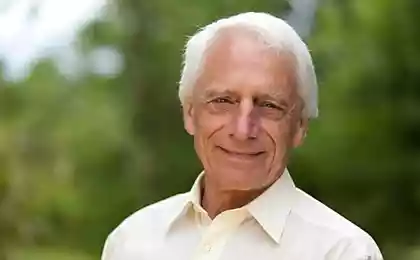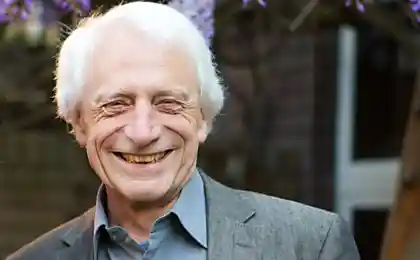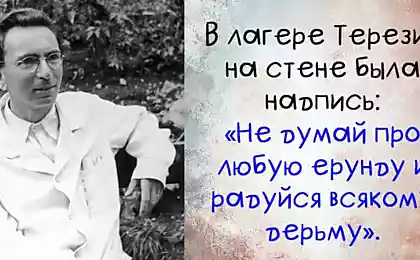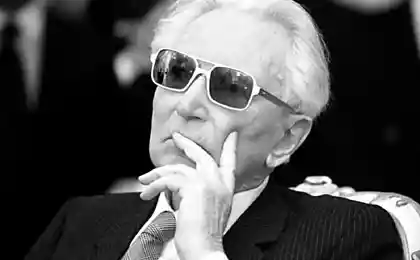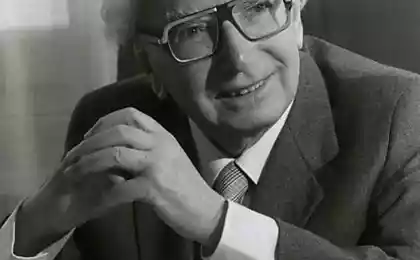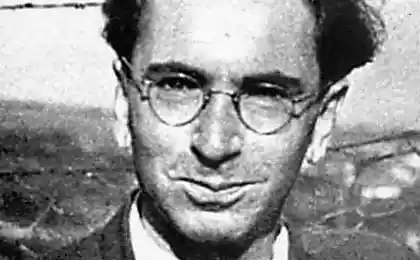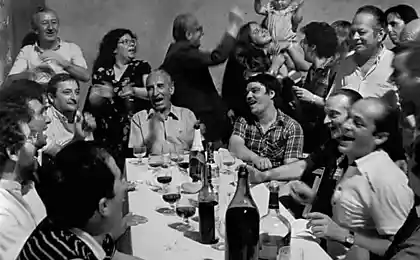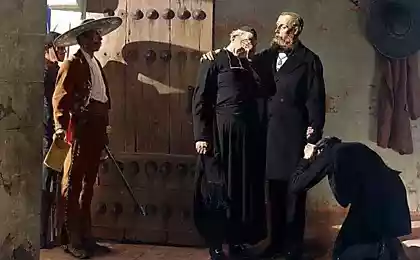579
Viktor Frankl: Will to meaning is the most human phenomenon
The will to meaning is the most human phenomenonI saw the meaning of his life is to help others see the meaning in their lives
Viktor Frankl
It is widely known judgment of Sigmund Freud, which he expressed in a letter to his follower and admirer of Maria Bonaparte: "If the person thinking about the meaning of life, so he's seriously ill." Not less known and more of his statement: "In his studies of the huge building of the human psyche I stayed in the basement." The attempts of his followers to ascend to the "upper floors" inevitably led to a critical reassessment of the classical heritage.
Viktor Frankl, fascinated by psychoanalysis in my youth, was not content with wandering in the "basement" and set up her own theories, own school, is diametrically opposed to the Freudian. In contrast to the skeptical position of the Vienna Patriarch, the search for meaning in life Frankl called the path to mental health, and the loss of sense — the main cause not only illness, but also many other human ills. The most well-known book by Frankl called "Man's search for meaning". Probably, this could be characterized and its author.
Sixty eight million four hundred twenty four thousand two hundred forty four
BETWEEN FREUD AND ADLERViktor Emil Frankl was born on 26 March 1905 in Vienna, where already at that time at the apartment of Dr. Freud was going on Wednesday psychological circle — the prototype of the Vienna psychoanalytic society. Members of the group can still be counted on the fingers, but it was already ironic skeptic Alfred Adler, who 6 years later, the scandal will leave the ranks of Freudians to set up his own school. Have already been published "the Interpretation of dreams", but almost half of the first edition were still gathering dust on the shelves unclaimed, as Freud and his followers rained the critical arrows.
However, by the time when Frankl reached adolescence and before him arose the problems of professional and personal identity, psychoanalysis has been formed in the influential for and received widespread acclaim. Even as a schoolboy, Frankl became interested in Freud's ideas, joined with him in personal correspondence. Freud favored the young man, in his patronage article 19-summer Victor Frankl was in 1924, published in "International journal of psychoanalysis". However, the young man not in the least interested in the idea of "apostate" Adler, who created the Second school of Viennese psychotherapy (first was considered to be Freudian).
Still not having received complete education, Frankl joined adlerians. This stage of his scientific career was marked by the publication in "International journal of individual psychology". However, cooperation was short-lived. In 1927, motivated by apparent disagreements with colleagues Frankl left the Society of individual psychology. However, these years have not gone unnoticed. They left an imprint on all subsequent creativity Frankl: in almost all his writings are Freud, and Adler — both explicit and implicit opponents.
Freud and Adler already belong to history, the subsequent development of left them far behind... Stekel have successfully determined the position of Affairs when he observed, explaining his relation to Freud, that the dwarf standing on the shoulders of a giant may see farther than the giant. In the end, although the individual may admire the Hippocrates and Paracelsus, there is no need to follow their guidelines or methods of surgery.
Psychoanalysis speaks of the pleasure principle, individual psychology — the desire for status.The pleasure principle can be defined as the will to pleasure; desire for status is equivalent to the will to power. But where is that which is most profoundly spiritual in man, where the innate human desire to make her life so much meaning as possible, to actualize as many values as possible — which is what I would call the will to meaning?
This will to meaning is the most human phenomenon, since the animal is not concerned with the meaning of his existence. However, psychotherapy transforms the will to meaning in human weakness, in the neurotic complex. The therapist who ignores the spiritual side of man and therefore forced to ignore the will to meaning, denies one of the most valuable advantages.
(Here and below italics are quotes from the works of V. Frankl)
After the First and Second Viennese schools of psychotherapy, Frankl embarked on the path of creating your own Third. Exactly what will be called later he created the doctrine. But had to go through years of accumulation of experience, the most difficult of life's challenges before youth ideas took shape into a coherent concept.
IMMUNITY AGAINST NIHILISMAbout his youth attitude Frankl wrote: "As a young man, I went through the hell of despair, overcoming the apparent meaninglessness of life, through extreme nihilism. Eventually, I was able to develop immunity against nihilism. So I created Logotherapy".
The term "Logotherapy" Frankl suggested in the 20-ies, subsequently, as equal used the term "existential analysis". "Logos" for Frankl, is not just "word" as it is commonly understood in national tradition. (So, the founder of Russian psychotherapy K. I. Platonov, the term "Logotherapy" was used to mean "word treatment" — in contrast to pharmacological and surgical treatments, that is, as a synonym of psychotherapy; in this sense, the term spread is not received. In some domestic works in correctional pedagogics the term "Logotherapy" is indicated the combination of psychotherapeutic methods and techniques to overcome speech disorders.)
Frankl draws on a broader understanding of the foundations of the Greek: "logos" is "word" not just as a verbal act, but as the quintessence of the ideas of sense, that is, it is the very meaning. This interpretation clarifies many misunderstandings in the interpretation of the gospel text: "In the beginning was the word...»
Received in 1930 the degree of doctor of medicine, Frankl continued to work in the field of clinical psychiatry, and by the end of the 30-ies of articles published in different medical journals, you can find the wording of all main ideas, which then grew by building his theory of Logotherapy and existential analysis.
In 1928 Frankl founded the Center for counseling youth in Vienna and served as its Director until 1938. From 1930 to 1938 he was a member of the staff of the University Neuropsychiatric clinic. In practical terms it since 1929 developed the technique of "paradoxical intention" — psychotherapeutic inversion method, based on the reinforcement of the fears of the patient and achieve a therapeutic effect according to the principle "from the contrary". In 1933 he completed an interesting study of "unemployment neurosis" that has (unfortunately!) enduring importance, however, is now rarely mentioned.
"IF THERE'S A REASON...»The accession of Austria to the Nazi Reich for the Jewish part of the population in the country (which belonged to her and Frankl) would have meant certain death. Shortly before the Anschluss he was able to emigrate to the United States, but he rejected it: received from America the invitation did not extend to his family, and Frankl considered unacceptable to leave them. (Probably in the science of the soul differences in worldview impact in all fields: Sigmund Freud, who went into exile with his wife and daughter, showed no concern for their sisters, and they all perished in the concentration camps.)
Fortuna gave Frankl a few years of delay. By happy coincidence, the Gestapo, who sent Frankl in the death camp, turned out to be his former patient and have deleted it from the list. But in 1942 about Dr. Frankl recalled again. Yes, and how could not remember the Department head of the Vienna Rothschild Jewish hospital! The furnaces of Auschwitz and Dachau demanded fuel, and Victor Frankl had become one of the millions of logs in their Hellfire.
He, however, survived. Here, too, met an accident, and regularity. The coincidence — that he may be one of the teams bound for death (bound not for any particular reason, but simply because the death machine needed someone to feed). A pattern — he went through it all, keeping himself, his personality, his "stubborn spirit", as he called a person's ability not to succumb, not to break under the blows, falls on the body and soul.In the concentration camps received verification and confirmation of his view of man, and you are unlikely to find at least one psychological theory of personality, which would be to such an extent personally suffered and paid such a dear price.
Any attempt to restore the power of the prisoner assumes as the most important condition of success finding some purpose in the future. The words of Nietzsche: "If there's a Why to live can bear almost any How" could be the motto for all psychotherapeutic and psychohygienic efforts... Woe to those who did not see more neither the purpose nor the meaning of their existence and, therefore, lost every point of support. He was soon killed.
The experiences of these terrible years and the meaning learned from this experience, Frankl described in his book "the Psychologist in a concentration camp," published shortly after the war. This book is from 1942 and 1945, in fact "written" them in my mind, and one of the incentives to survival was the desire to keep it, and eventually publish. Although, as recognized by the author, the book he "wrote with the conviction that it will not bring, can not bring success and glory" of all his books this was the most popular.
After this book was published in 1959 in English, it has sustained a huge number of editions in dozens of languages around the world and overall, its circulation has exceeded 2.5 million (in total he wrote 16 books, their total circulation is beyond counting; against this background, particularly distressing, in as narrow a circle Frankl popular in our country — many psychologists about it not even heard of).
Twenty one million eight hundred twenty five thousand four hundred nineteen
QUESTIONS TO ASK YOURSELFThe end of the forties marked the brightest burst of creativity Frankl. His books — philosophical, psychological, medical — appear one after the other. Among his most significant works (in addition to the above) — "Dr. soul", "Psychotherapy and existentialism", "the Will to meaning," "Time and responsibility", "Unconscious God", "Psychotherapy in practice".
In 1946 Frankl became Director of the Vienna neurological hospital, since 1947, began teaching at the University of Vienna in 1949, received the degree of doctor of philosophy in 1950, headed by the Austrian society of psychotherapists. In the 60 years of the publishing of his writings in English earned him worldwide fame, belatedly reached our shores only in the early 90's.
Frankl traveled around the world twice with lectures on Logotherapy, has visited many countries, including in the USSR (audience of psychologists at Moscow state University, greeted him with a standing ovation). He died in deep old age in his native Vienna.
In our country, his ideas are still waiting for this recognition. Because Logotherapy is not so much a technique as a philosophy. Unlike so beloved by many manipulative of manners, his vision did not include policy recommendations and techniques. To the question whether there are such, Frankl liked to answer: "It's like asking a chess grandmaster what chess move is the best". After all, the meaning of his life every man is for himself.
Man should not ask what the meaning of his life, but soon must realize that he is the one to whom the question is addressed. published
Author: Sergey Stepanov
P. S. And remember, just changing your mind — together we change the world! ©
Source: //frankl.hpsy.ru/biography/
Viktor Frankl
It is widely known judgment of Sigmund Freud, which he expressed in a letter to his follower and admirer of Maria Bonaparte: "If the person thinking about the meaning of life, so he's seriously ill." Not less known and more of his statement: "In his studies of the huge building of the human psyche I stayed in the basement." The attempts of his followers to ascend to the "upper floors" inevitably led to a critical reassessment of the classical heritage.
Viktor Frankl, fascinated by psychoanalysis in my youth, was not content with wandering in the "basement" and set up her own theories, own school, is diametrically opposed to the Freudian. In contrast to the skeptical position of the Vienna Patriarch, the search for meaning in life Frankl called the path to mental health, and the loss of sense — the main cause not only illness, but also many other human ills. The most well-known book by Frankl called "Man's search for meaning". Probably, this could be characterized and its author.
Sixty eight million four hundred twenty four thousand two hundred forty four
BETWEEN FREUD AND ADLERViktor Emil Frankl was born on 26 March 1905 in Vienna, where already at that time at the apartment of Dr. Freud was going on Wednesday psychological circle — the prototype of the Vienna psychoanalytic society. Members of the group can still be counted on the fingers, but it was already ironic skeptic Alfred Adler, who 6 years later, the scandal will leave the ranks of Freudians to set up his own school. Have already been published "the Interpretation of dreams", but almost half of the first edition were still gathering dust on the shelves unclaimed, as Freud and his followers rained the critical arrows.
However, by the time when Frankl reached adolescence and before him arose the problems of professional and personal identity, psychoanalysis has been formed in the influential for and received widespread acclaim. Even as a schoolboy, Frankl became interested in Freud's ideas, joined with him in personal correspondence. Freud favored the young man, in his patronage article 19-summer Victor Frankl was in 1924, published in "International journal of psychoanalysis". However, the young man not in the least interested in the idea of "apostate" Adler, who created the Second school of Viennese psychotherapy (first was considered to be Freudian).
Still not having received complete education, Frankl joined adlerians. This stage of his scientific career was marked by the publication in "International journal of individual psychology". However, cooperation was short-lived. In 1927, motivated by apparent disagreements with colleagues Frankl left the Society of individual psychology. However, these years have not gone unnoticed. They left an imprint on all subsequent creativity Frankl: in almost all his writings are Freud, and Adler — both explicit and implicit opponents.
Freud and Adler already belong to history, the subsequent development of left them far behind... Stekel have successfully determined the position of Affairs when he observed, explaining his relation to Freud, that the dwarf standing on the shoulders of a giant may see farther than the giant. In the end, although the individual may admire the Hippocrates and Paracelsus, there is no need to follow their guidelines or methods of surgery.
Psychoanalysis speaks of the pleasure principle, individual psychology — the desire for status.The pleasure principle can be defined as the will to pleasure; desire for status is equivalent to the will to power. But where is that which is most profoundly spiritual in man, where the innate human desire to make her life so much meaning as possible, to actualize as many values as possible — which is what I would call the will to meaning?
This will to meaning is the most human phenomenon, since the animal is not concerned with the meaning of his existence. However, psychotherapy transforms the will to meaning in human weakness, in the neurotic complex. The therapist who ignores the spiritual side of man and therefore forced to ignore the will to meaning, denies one of the most valuable advantages.
(Here and below italics are quotes from the works of V. Frankl)
After the First and Second Viennese schools of psychotherapy, Frankl embarked on the path of creating your own Third. Exactly what will be called later he created the doctrine. But had to go through years of accumulation of experience, the most difficult of life's challenges before youth ideas took shape into a coherent concept.
IMMUNITY AGAINST NIHILISMAbout his youth attitude Frankl wrote: "As a young man, I went through the hell of despair, overcoming the apparent meaninglessness of life, through extreme nihilism. Eventually, I was able to develop immunity against nihilism. So I created Logotherapy".
The term "Logotherapy" Frankl suggested in the 20-ies, subsequently, as equal used the term "existential analysis". "Logos" for Frankl, is not just "word" as it is commonly understood in national tradition. (So, the founder of Russian psychotherapy K. I. Platonov, the term "Logotherapy" was used to mean "word treatment" — in contrast to pharmacological and surgical treatments, that is, as a synonym of psychotherapy; in this sense, the term spread is not received. In some domestic works in correctional pedagogics the term "Logotherapy" is indicated the combination of psychotherapeutic methods and techniques to overcome speech disorders.)
Frankl draws on a broader understanding of the foundations of the Greek: "logos" is "word" not just as a verbal act, but as the quintessence of the ideas of sense, that is, it is the very meaning. This interpretation clarifies many misunderstandings in the interpretation of the gospel text: "In the beginning was the word...»
Received in 1930 the degree of doctor of medicine, Frankl continued to work in the field of clinical psychiatry, and by the end of the 30-ies of articles published in different medical journals, you can find the wording of all main ideas, which then grew by building his theory of Logotherapy and existential analysis.
In 1928 Frankl founded the Center for counseling youth in Vienna and served as its Director until 1938. From 1930 to 1938 he was a member of the staff of the University Neuropsychiatric clinic. In practical terms it since 1929 developed the technique of "paradoxical intention" — psychotherapeutic inversion method, based on the reinforcement of the fears of the patient and achieve a therapeutic effect according to the principle "from the contrary". In 1933 he completed an interesting study of "unemployment neurosis" that has (unfortunately!) enduring importance, however, is now rarely mentioned.
"IF THERE'S A REASON...»The accession of Austria to the Nazi Reich for the Jewish part of the population in the country (which belonged to her and Frankl) would have meant certain death. Shortly before the Anschluss he was able to emigrate to the United States, but he rejected it: received from America the invitation did not extend to his family, and Frankl considered unacceptable to leave them. (Probably in the science of the soul differences in worldview impact in all fields: Sigmund Freud, who went into exile with his wife and daughter, showed no concern for their sisters, and they all perished in the concentration camps.)
Fortuna gave Frankl a few years of delay. By happy coincidence, the Gestapo, who sent Frankl in the death camp, turned out to be his former patient and have deleted it from the list. But in 1942 about Dr. Frankl recalled again. Yes, and how could not remember the Department head of the Vienna Rothschild Jewish hospital! The furnaces of Auschwitz and Dachau demanded fuel, and Victor Frankl had become one of the millions of logs in their Hellfire.
He, however, survived. Here, too, met an accident, and regularity. The coincidence — that he may be one of the teams bound for death (bound not for any particular reason, but simply because the death machine needed someone to feed). A pattern — he went through it all, keeping himself, his personality, his "stubborn spirit", as he called a person's ability not to succumb, not to break under the blows, falls on the body and soul.In the concentration camps received verification and confirmation of his view of man, and you are unlikely to find at least one psychological theory of personality, which would be to such an extent personally suffered and paid such a dear price.
Any attempt to restore the power of the prisoner assumes as the most important condition of success finding some purpose in the future. The words of Nietzsche: "If there's a Why to live can bear almost any How" could be the motto for all psychotherapeutic and psychohygienic efforts... Woe to those who did not see more neither the purpose nor the meaning of their existence and, therefore, lost every point of support. He was soon killed.
The experiences of these terrible years and the meaning learned from this experience, Frankl described in his book "the Psychologist in a concentration camp," published shortly after the war. This book is from 1942 and 1945, in fact "written" them in my mind, and one of the incentives to survival was the desire to keep it, and eventually publish. Although, as recognized by the author, the book he "wrote with the conviction that it will not bring, can not bring success and glory" of all his books this was the most popular.
After this book was published in 1959 in English, it has sustained a huge number of editions in dozens of languages around the world and overall, its circulation has exceeded 2.5 million (in total he wrote 16 books, their total circulation is beyond counting; against this background, particularly distressing, in as narrow a circle Frankl popular in our country — many psychologists about it not even heard of).
Twenty one million eight hundred twenty five thousand four hundred nineteen
QUESTIONS TO ASK YOURSELFThe end of the forties marked the brightest burst of creativity Frankl. His books — philosophical, psychological, medical — appear one after the other. Among his most significant works (in addition to the above) — "Dr. soul", "Psychotherapy and existentialism", "the Will to meaning," "Time and responsibility", "Unconscious God", "Psychotherapy in practice".
In 1946 Frankl became Director of the Vienna neurological hospital, since 1947, began teaching at the University of Vienna in 1949, received the degree of doctor of philosophy in 1950, headed by the Austrian society of psychotherapists. In the 60 years of the publishing of his writings in English earned him worldwide fame, belatedly reached our shores only in the early 90's.
Frankl traveled around the world twice with lectures on Logotherapy, has visited many countries, including in the USSR (audience of psychologists at Moscow state University, greeted him with a standing ovation). He died in deep old age in his native Vienna.
In our country, his ideas are still waiting for this recognition. Because Logotherapy is not so much a technique as a philosophy. Unlike so beloved by many manipulative of manners, his vision did not include policy recommendations and techniques. To the question whether there are such, Frankl liked to answer: "It's like asking a chess grandmaster what chess move is the best". After all, the meaning of his life every man is for himself.
Man should not ask what the meaning of his life, but soon must realize that he is the one to whom the question is addressed. published
Author: Sergey Stepanov
P. S. And remember, just changing your mind — together we change the world! ©
Source: //frankl.hpsy.ru/biography/
Julia simultaneously: the 3 sign that you were able to listen to the child
Where to go for the may holidays in Russia to 2017



